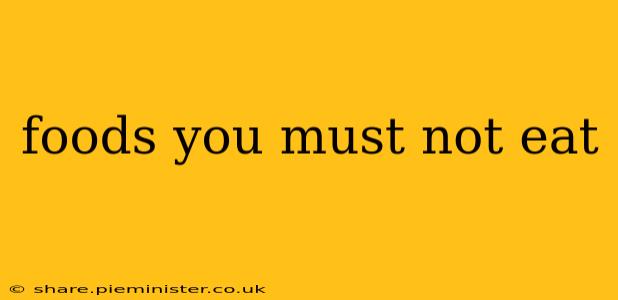Navigating the world of food can be tricky. While a varied and nutritious diet is key to good health, some foods present significant risks if not handled or consumed correctly. This guide explores foods you must avoid, focusing on potential dangers and safe food practices. Remember, individual tolerances vary, and consulting a doctor or registered dietitian is crucial for personalized dietary advice.
Foods to Avoid Due to Allergic Reactions
One of the most important categories of foods to avoid are those that trigger allergic reactions. These reactions can range from mild discomfort to life-threatening anaphylaxis. Common food allergens include:
- Peanuts: Peanut allergies are incredibly common and often severe. Even trace amounts can cause a reaction in susceptible individuals.
- Tree nuts (almonds, walnuts, cashews, etc.): Similar to peanuts, tree nut allergies are widespread and can be dangerous.
- Milk: Dairy products contain proteins that trigger reactions in many people, ranging from mild digestive issues to severe allergic responses.
- Eggs: Egg whites and yolks contain proteins that are common allergens.
- Soy: Soybeans and products derived from them are another frequent source of allergic reactions.
- Wheat: Gluten, a protein found in wheat, triggers celiac disease and other gluten-related disorders. While not strictly an allergy for everyone, it's crucial to avoid if you have these conditions.
- Fish and shellfish: These seafood categories often contain allergens that can cause severe reactions.
- Sesame seeds: Sesame allergies are becoming increasingly prevalent and can be very serious.
Always check food labels carefully for potential allergens. Many processed foods contain hidden allergens, even in small quantities. If you have known allergies, communicate them clearly to restaurants and food providers.
Foods to Avoid Due to Spoilage and Contamination
Foodborne illnesses are a significant concern. Improper storage, handling, and preparation can lead to serious health problems. Here's what to avoid:
- Spoiled meat: Meat that has changed color significantly (e.g., excessively gray or green), has a foul odor, or is slimy is spoiled and should be discarded.
- Expired dairy products: Milk, yogurt, and cheese that have passed their expiration dates should not be consumed, as they may harbor harmful bacteria.
- Unpasteurized dairy products: Unpasteurized milk and cheeses can contain harmful bacteria like Listeria and E. coli.
- Undercooked poultry and eggs: Thoroughly cook poultry and eggs to eliminate the risk of salmonella and other bacteria.
- Improperly stored leftovers: Food left at room temperature for too long should be thrown away. Refrigerate leftovers promptly and consume within a reasonable timeframe.
Proper food storage and handling are essential for preventing foodborne illnesses. Always refrigerate perishable items promptly, cook foods to the appropriate internal temperature, and wash your hands thoroughly before preparing food.
Foods to Avoid Due to Toxicity
Certain foods are naturally toxic or contain substances that can be harmful in large quantities:
- Raw or undercooked beans: Raw beans contain toxins that can cause nausea, vomiting, and diarrhea. Proper cooking is essential to neutralize these toxins.
- Certain mushrooms: Many wild mushrooms are poisonous, and some can be fatal. Only consume mushrooms that have been identified as safe by an expert.
- Unripe ackee fruit: The unripe ackee fruit contains hypoglycin A, which can cause vomiting and even death.
- Cassava: Cassava root contains cyanide compounds; improper processing can lead to cyanide poisoning.
Exercise extreme caution when consuming unfamiliar foods, especially wild plants. If you are unsure about the safety of a food, err on the side of caution and avoid it.
What Foods Should I Limit?
While not outright foods to avoid, these need to be consumed in moderation:
- Processed foods high in sodium: Excessive sodium intake can contribute to high blood pressure and other health problems.
- Sugary drinks and foods: High sugar consumption is linked to weight gain, diabetes, and other health issues.
- Foods high in saturated and trans fats: These fats can raise cholesterol levels and increase the risk of heart disease.
This guide highlights some key food safety concerns. Remember to prioritize food safety practices, read food labels carefully, and consult with healthcare professionals if you have any concerns about specific foods or dietary needs. Your health and well-being depend on it.
